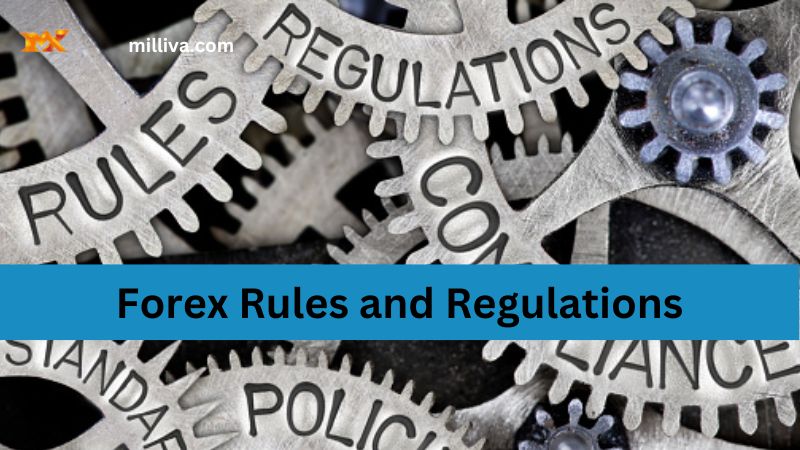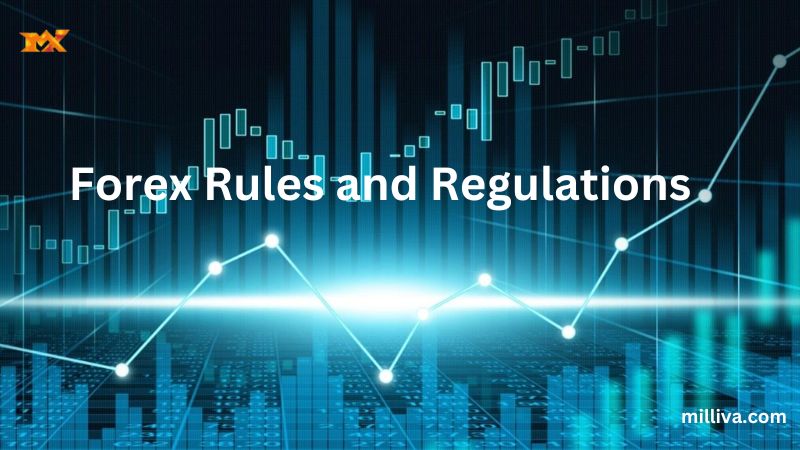Forex Rules and Regulations

![]()
There are many Forex rules and regulations, they include regulated Forex brokers must have enough funds to cover client’s investments, platforms must comply with fair representation legislation, risks need to be presented well to the clients, and the broker needs to be open for regular audits and investigations.
A regulated broker represents a safe and legit trading broker compliant with the international authority’s various rules and criteria to secure trading and good customer service. Each country has its own regulatory body that monitors brokers and traders to complain to the regulatory authority if they have problems with their accounts, withdrawal issue, and scam attempts. In this article let’s see about Forex rules and regulations.
Broker regulations are the kind of regulation that has great significance in it. Broker regulations are related to the state and authority. There are few criteria’s to be consider while choosing the broker, one of which is the regulatory status.
Regulatory status is known to be the process under which the regulatory body is governed. In general, it means to confirm a rule: specification such as policy, standard, or law, law of any order or statement.
Work or Duty of a Broker
Whatever work they do, every person has some different duty, or if not, they have different rules and other things to follow. The responsibility of a broker is to conduct the business they are doing without any regulations. So it acts or poses as a kind of a direct risk to the client’s security. This security of the clients means the protection of the client’s wealth or money.
Purpose of Broker Regulations
Brokers have some specific duties, and so the purpose for which the broker regulations, that this same approach is used to ensure or to make sure that all the requirements a governance needs can meet without any stop or any difficulty or trouble. There are some regulations for a Forex broker.
Another term that has been derive from broker regulations is the regulatory body. It is also known as regulatory agency. A regulatory body or regulatory agency is a public authority or a public right, or any government agency responsible for running or exercising the autonomous authority, which means having the right and the power to make your own decision and implement your ideas.
It is not dependent upon authorities; instead, it is independent of and free from the branches or any army of any authority. Army means any group or any member of the authority.
Main Regulatory Requirements
Client conduct include these insure brokers cannot make unrealistic or misleading claims or promise. It also prevents brokers from advising clients to take risky trade decisions or to enter into positions that are not in their best interest.
Segregation of client funds include restrictions ensure that the broker cannot use any of the client’s funds for its operational or other expenses. This regulation requires that all deposits be maintain separately from the broker’s bank accounts.
Reporting and disclosure includes rules insure the brokers clients are well inform of the status of their account and the risks associated with Forex products. Leverage limits include limits ensure clients maintain an acceptable risk level. As such, firms may not offer increasingly higher leverage to consumers.
Minimum capital requirements include restrictions ensure that clients can withdraw their funds. At any time including in the event of the broker. Periodic auditing assures the broker financial risk is tolerable and there is no misappropriation of funds. Brokers must submit periodic financial and capital adequacy statements, to this end.

U.S. Rules and Regulations for Forex Brokers
Forex run constantly across the globe through over the counter markets. This boundary less space allows seamless access. Speculative trading in the retail Forex market continues to grow. As a result, there can be intermediaries, who engage in financial irregularities, scams, exorbitant charges, hidden fees, and high risk exposure offered through high-leverage levels or other bad practices.
Internet and mobile app based trading allow smooth trading processes. But they also add the risk of unrecognized sites that may close unexpectedly and abscond with investors’ money. Regulations ensure such practices are avoid. Regulations are aimed at protecting individual investors and ensuring fair operations to safeguard client’s interests.
How U.S. Authorities Regulate Forex Brokerage Accounts
The national futures association is the “premier independent provider of efficient and innovative regulatory programs that safeguard the integrity of the derivatives markets”. The NFA activities includes, to provide necessary licenses to eligible Forex brokers to conduct Forex trading business.
To enforce required adherence to necessary capital requirements, to combat fraud. And to enforce detailed record keeping and reporting requirements regarding all transactions and related business activities.
Broker Work on the Lower Standard
Usually, it so happens that the brokers or so called workers work for the finance or finances. They are distracting registered with the industry related to money, or finance that is the financial industry. They are register for it and work for you.
Brokers work and serve for the finances, so it include people for whom they work of broker regulations is done. Brokers deal with the clients. They efficiently do their work and give the best of their ability not to have any point to complain.
The suitability rile is the rule or the kind of work that includes serving the clients. And the conduct of the brokers must be based on this rule. It is require or stated requirement that the regulatory body has implied. In this processor stability rule, the brokers advise about the business or investment they have done or are interest in.
It will ensure the clients that the investment they have made is going to help or benefit them or not. This way, the client will be satisfy that they are making the right decision or not through their recommendations.
The Bottom Line
Financial regulations are complex and often change as markets develop. They also attempt to strike a balance. Too little regulation may lead to ineffective investor protection. While too much regulation can be result in reduced global competitiveness and dampen economic activity. These are the basic rules and regulations for trading Forex.

Visit us on: www.milliva.com





